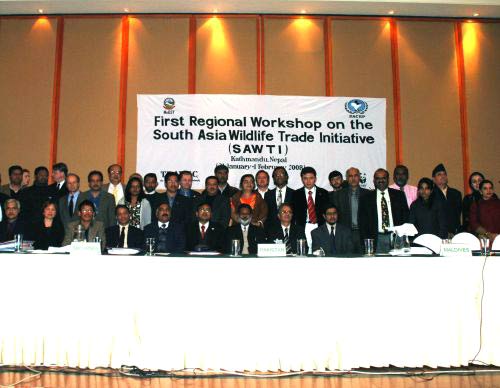South Asia commits to regional co-operation in controlling wildlife trade
Kathmandu, Nepal, 7th February 2008 - The eight member countries of the South Asia Co-operative Environment Programme (SACEP), an inter-government organisation established in 1982 for promoting regional co-operation in South Asia in the field of environment, have agreed on a courageous initiative to work together to address the region's wildlife trade problems. Senior wildlife officials from these countries agreed to a series of joint actions as part of a South Asia Wildlife Trade Initiative (SAWTI), including the establishment of a South Asia Experts Group on Wildlife Trade and the development of a South Asia Regional Strategic Plan on Wildlife Trade (2008-2013).

They also called upon the international community to support action in South Asia by providing financial and technical assistance in the implementation of the regional plan.
The First Regional Workshop on the South Asia Wildlife Trade Initiative was organised by the Nepal Ministry of Environment, Science and Technology; SACEP; WWF Nepal; and TRAFFIC, the wildlife trade monitoring network. Held in Kathmandu, Nepal, from 31st January – 1st February 2008, the workshop included participants from all eight South Asian countries - Afghanistan, Bangladesh, Bhutan, India, the Maldives, Nepal, Pakistan and Sri Lanka. The Workshop was made possible with funding from the US Department of State, SACEP and WWF.
The South Asia region is a storehouse of biological diversity and rich terrestrial, freshwater and marine resources. As a result, illegal trade and overexploitation of wild animals and plants poses a major challenge to the conservation and sustainable use of biodiversity in South Asia. Recognizing this challenge, Ministers at the Tenth Meeting of the Governing Council of SACEP, on 25th January 2007, urged for the development of a work programme to combat illegal trade in wild species and their products, and help strengthen enforcement of the Convention on International Trade in Endangered Species of Wild Fauna and Flora (CITES) in the region.
Following SACEP’s Governing Council Decision, participants in Kathmandu this month agreed that the South Asia Wildlife Trade Initiative (SAWTI) and its South Asia Regional Strategic Plan on Wildlife Trade will focus on a number of key areas of work. These include co-operation and co-ordination; effective legislation, policies and law enforcement; sharing knowledge and effective
dissemination of information; sustainability of legal trade and livelihoods security; intelligence networks and early warning systems; and capacity building.
In closing the workshop, Nepal’s Honourable Minister for Environment, Science and Technology, Farmullah Mansoor, confirmed the Government of Nepal’s commitment towards combating the illegal wildlife trade in the region. Nepal currently holds the chair position of SACEP’s Governing Council.
SACEP Director-General Dr Arvind A. Boaz emphasised that regional co-operation can provide the best solution for regional problems. “The agreement reached on SAWTI puts in place the foundations for a co-operative effort to crack down on illegal trade and to improve the management of wild species that can be legally traded under national laws in the region,” Boaz said.
"SAWTI is the first wildlife trade initiative of its kind in South Asia and SACEP is confident it will lead to further commitment in the region, and closer engagement among neighbours to effectively address wildlife trade problems," Boaz added.
John Sellar, Senior Officer for Anti-smuggling, fraud and organized crime at the CITES Secretariat, very much welcomed this Initiative: “We look forward to co-operating with SAWTI, which we believe offers considerable potential in combating illegal trade in wildlife, whilst also working to ensure that legal trade in wildlife is sustainable and benefits local communities in this part of the world.”
TRAFFIC’s Global Programme Co-ordinator, Roland Melisch said that international co-operation – and, in particular, regional co-operation – was absolutely essential in tackling the challenges of wildlife trade.
“TRAFFIC would certainly like to applaud the initiative of all the eight countries of South Asia in taking this important step of coming together as a region and seeking to jointly address the pressing issues of ensuring sustainable wildlife use and trade and eliminating the problem of illegal poaching and trade,” Melisch said.
This was echoed by WWF Nepal’s Country Representative, Anil Manandhar, who said that the greatest challenge was combating the highly organised illegal trade networks between poachers, domestic traders and international traders of wildlife products, combined with highly porous borders between some countries. “No single nation can control such illegal activities alone," Manandhar said.
TRAFFIC is a key strategic partner in a number of similar regional efforts worldwide. This includes the inter-governmental Regional Action Plan and its Wildlife Enforcement Network that has been established by the Association of Southeast Asian Nations (ASEAN) and the development of the European Community Action Plan on CITES Enforcement. TRAFFIC is also a member of the Coalition Against Wildlife Trafficking (CAWT), a global initiative comprising governments and non-governmental organisations and aimed at focussing public and political attention and resources on ending the illegal trade in wildlife and wildlife products.
The decisions of this workshop will be presented for endorsement at Ministerial level at the Eleventh Meeting of the Governing Council of SACEP taking place later this year in New Delhi, India.
Notes:
The First Regional Workshop on the South Asia Wildlife Trade Initiative, 31st January-1st February 2008 Kathmandu, Nepal. (2008). Workshop Report




